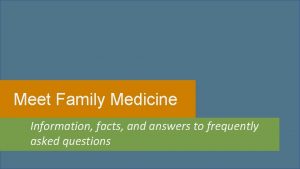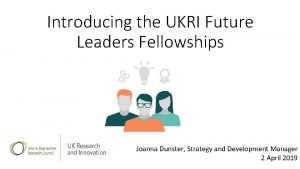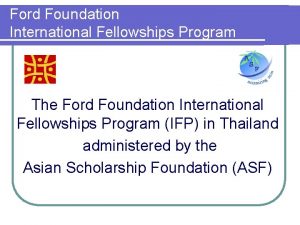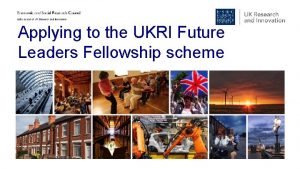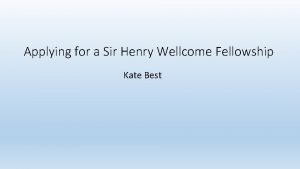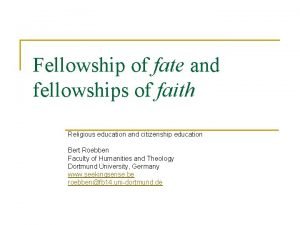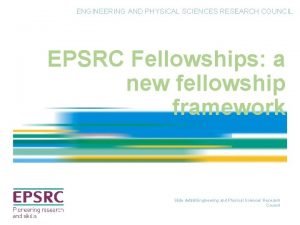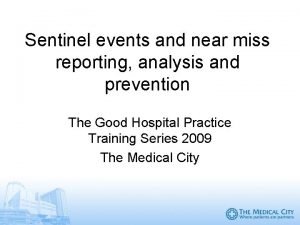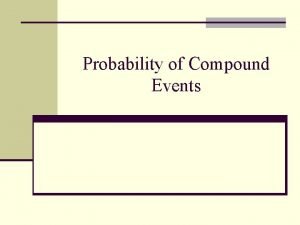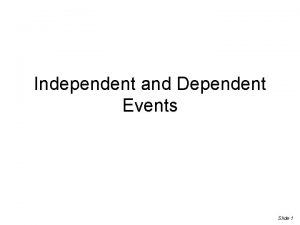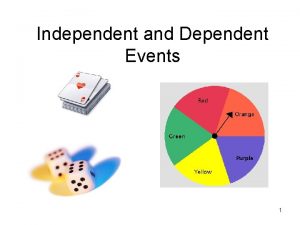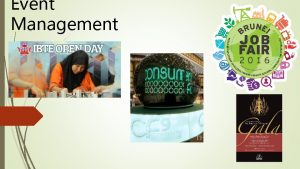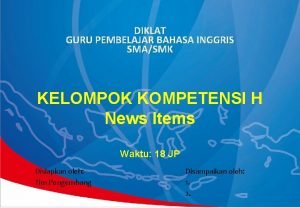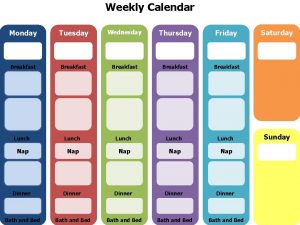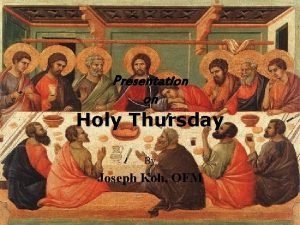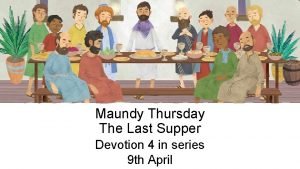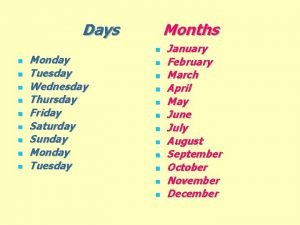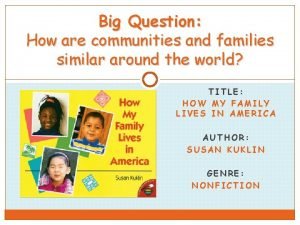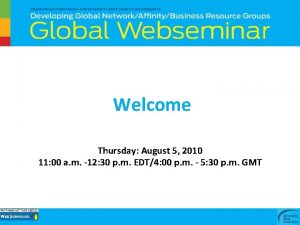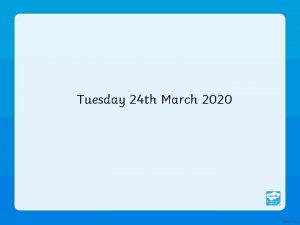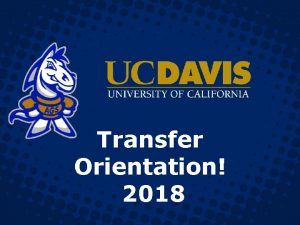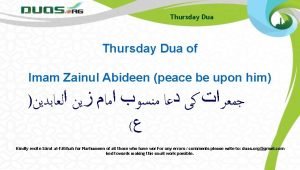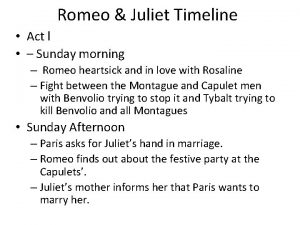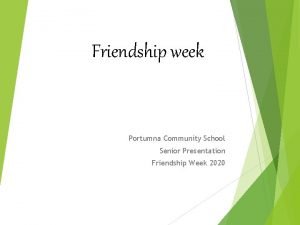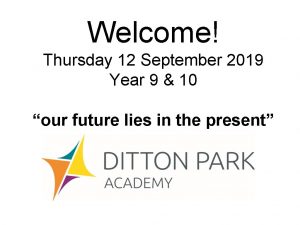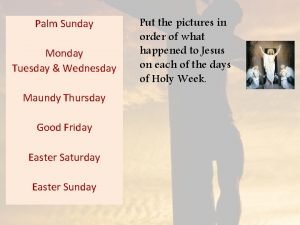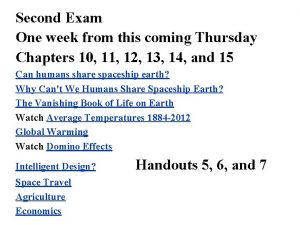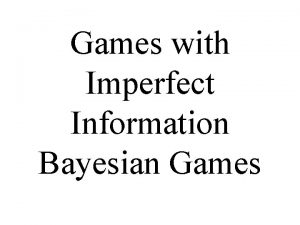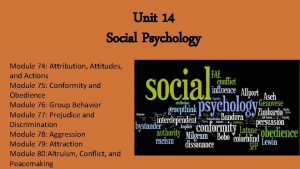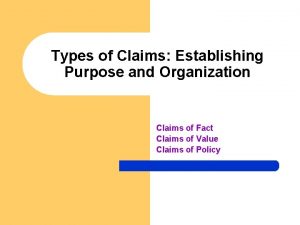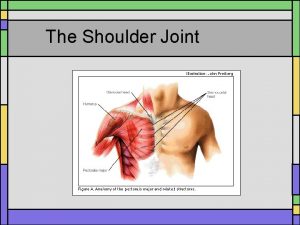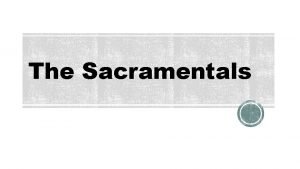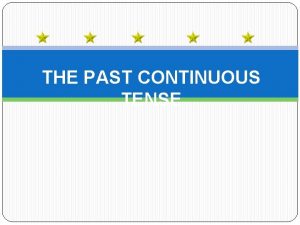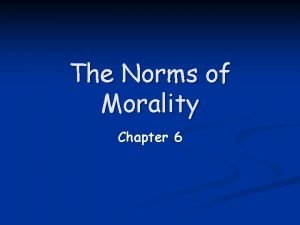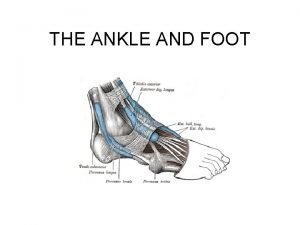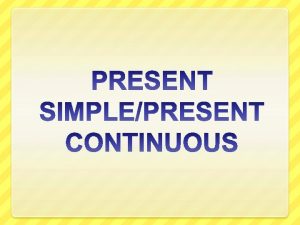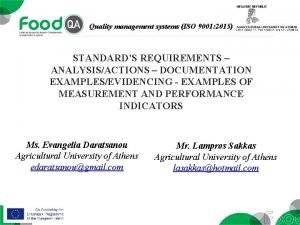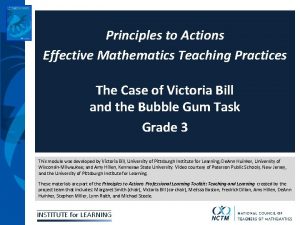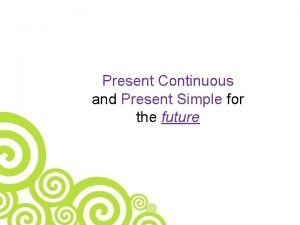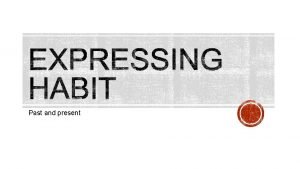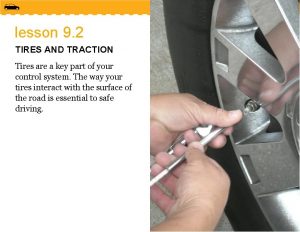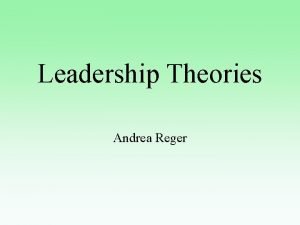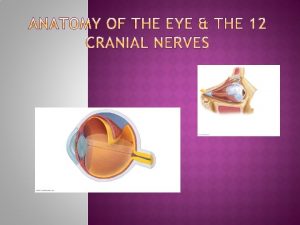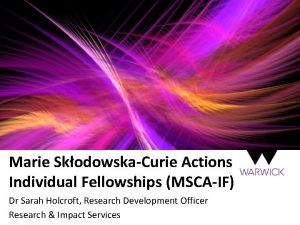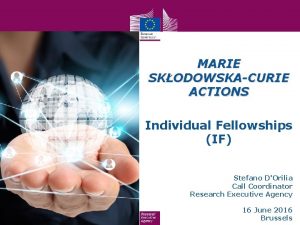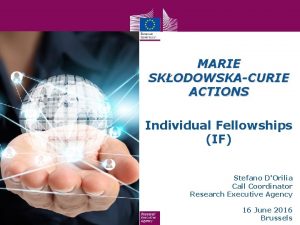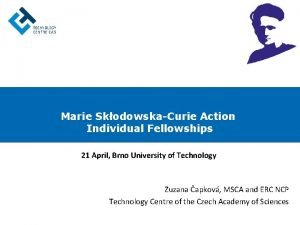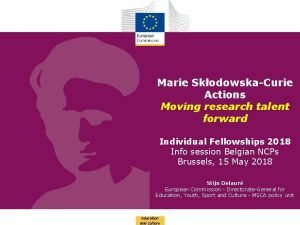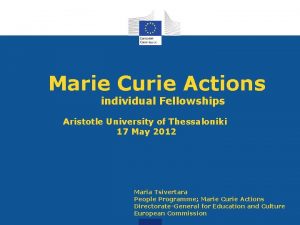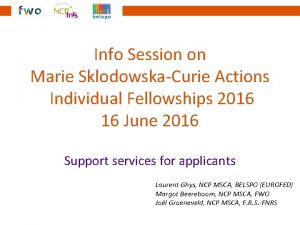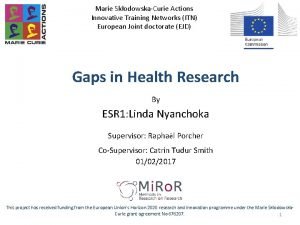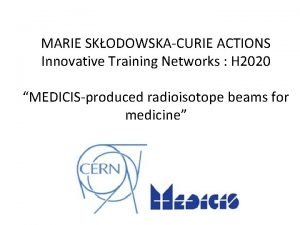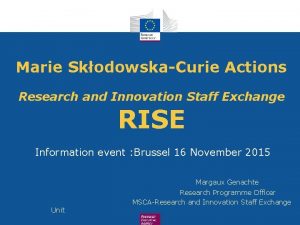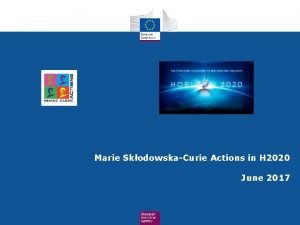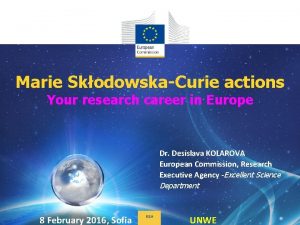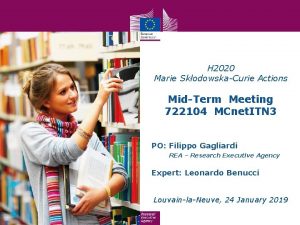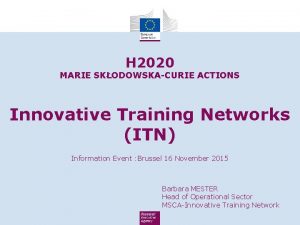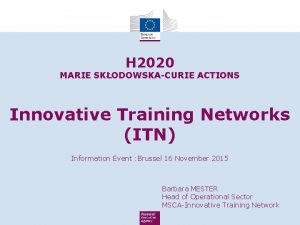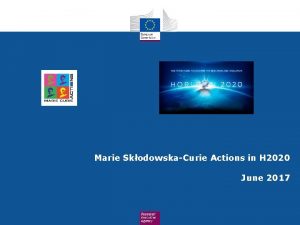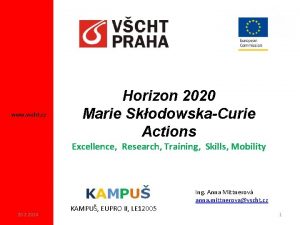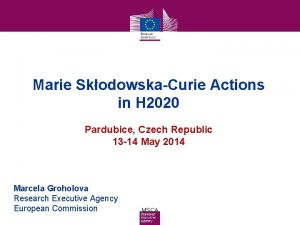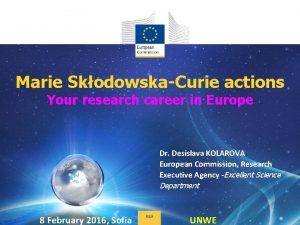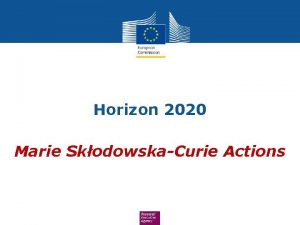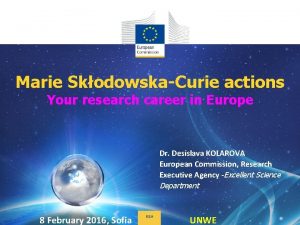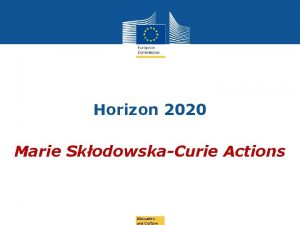Marie SkodowskaCurie Actions Individual Fellowships Information Event Thursday


































































- Slides: 66

Marie Skłodowska-Curie Actions Individual Fellowships Information Event Thursday 13 June 2019 University of Newcastle mariecurie-uk@bbsrc. ac. uk

About the UK Research Office Mission • To maximise UK engagement in EU-funded research, innovation and higher education activities Our office • Established in 1984, based in Brussels • UKRO is sponsored by UK Research and Innovation (UKRI) • Delivers subscription-based advisory services for around 150 research organisations in the UK and beyond • Provides National Contact Point services on behalf of the UK Government

UKRO National Contact Points • Advice on the European Research Council and the Marie Skłodowska-Curie Actions • Websites – www. ukro. ac. uk/erc – www. ukro. ac. uk/mariecurie • Helpdesk – erc-uk@bbsrc. ac. uk; Phone: 0032 2289 6121 – mariecurie-uk@bbsrc. ac. uk; Phone: 0032 2230 0318 • Follow UKRO NCPs on social media • Funded by

UKRO Conference 2019 27 -28 June, Edgbaston Park Conference Centre, University of Birmingham • Register Now! – More information can be found on our UKRO Conference Booking Website • Topics for sessions include but are not limited too; Horizon 2020 and Horizon Europe; Continuity of the UK involvement in and post-Horizon 2020; Missions and their role in Horizon Europe; Open Science; Gender; Integration of Social Sciences and Humanities Horizon 2020; ERC and MSCA. Questions/Comments/Ideas to; Sarah. Ashwood@bbsrc. ac. uk

Continued UK Engagement in Horizon 2020 General Update on the Current Situation Information for IF Applicants Will be provided after the event

Marie Skłodowska-Curie Actions (MSCA)

Horizon 2020 structure Excellent Science European Research Council (ERC) Future and Emerging Technologies (FET) Marie Skłodowska. Curie Actions (MSCA) Research Infrastructures Industrial Leadership Societal Challenges Health and Wellbeing Leadership in Enabling and Industrial Technologies (LEIT) - ICT, NMBP, Space Access to Risk Finance Innovation in SMEs Food security Transport Energy Climate action Societies Security Widening Participation; Science with and for Society, Mainstreaming of Social Sciences and Humanities (SSH) and ICT, Fast Track to Innovation European Institute of Innovation and Technology (EIT) EURATOM Joint Research Centre (JRC)

Marie Skłodowska-Curie Actions (MSCA) 2018 -20 Work Programme “…contribute to excellent research, boosting jobs, growth and investment by equipping researchers with the new knowledge, skills and international and intersectoral exposure to fill the top positions of tomorrow and solve current and future societal challenges. . . based on the principle of mobility…open to researchers and innovation staff at all stages… ensuring good working conditions and work/life balance…”

MSCA Policy Objectives Encouraging people to become researchers and to carry out research in Europe Foster innovation, research-business cooperation, including a strong international component Contribute to excellent research, boosting jobs Develop attractive career opportunities Equip researchers with the necessary skills and international experience for a successful career either in the public or the private sector Ensure the optimum development and dynamic use of Europe’s intellectual capital Generate new skills, knowledge and innovation

MSCA Key Features Operates on a ‘bottom-up’ basis For any research and innovation ideas (basic research; market take-up) Mobility (cross-border and cross-sector) is a key requirement Enhance skills of people behind research and innovation Strong participation across sectors Dissemination and public engagement - public outreach Gender balance – equal opportunities in the research content

Types of MSCA Actions Innovative Training Networks (ITN) • For Early Stage Researchers Individual Fellowships (IF) • For Experienced Researchers Research and Innovation Staff Exchange (RISE) • Exchange visits (secondments) of staff Co-funding of programmes (COFUND) • For regional, national, international doctoral or fellowship programmes

MSCA Individual Fellowships Overview, funding rules and application process

MSCA Individual Fellowships Aim to: • Enhance the creative and innovative potential of Experienced Researchers (ER) • Provide opportunities to researchers of any nationality to acquire and transfer new knowledge and to work on research and innovation in Europe (EU Member States [MS] and Horizon 2020 Associated Countries [AC]) and beyond • Support the return and (re)integration of European researchers from outside Europe and those who have previously worked here (MSCA-IF-EF-RI) • Promote the career Indicative restart of. Call individual budget: €researchers 294. 49 million(MSCA-IF-EF-CAR) • Global Fellowships: € 50 million seeking to work on research and • Encourage opportunities for researchers • European Fellowships: € 236. 49 million innovation projects • in. Society an organisation from the non-academic sector (MSCAand Enterprise Panel: € 8 million. IF-EF-SE) • The distribution of the indicative budget of the call will proportional to the number of eligible proposals • Support researchers be displaced by conflict outside the EU and Horizon 2020 received in each panel, except where a specific budget Associated Countries. for a multidisciplinary panel has been fixed in the call. • There is a higher weighting for the proposals of the IF Career Restart Panel (CAR) and the IF Reintegration Panel (RI). (see Guide for Applicants) Indicative timetable for this call: • Deadline for submission of proposals: 11 September 2019 at 17: 00 CET (16: 00 GMT) • Evaluation of proposals: October - December 2019 • Information on the outcome of the evaluation: February 2020 • Indicative date for the signature of Grant Agreements March - May 2020 • Call ID: MSCA-IF-2019

Expected Impact At system level: Researcher level: • Increased set of skills, both research-related and transferable ones • improved employability and career prospects both in and outside academia • Increase in higher impact R&I output; Greater contribution to the knowledge-based economy and society Organisation level: • Enhanced cooperation and stronger networks • Better transfer of knowledge between sectors and disciplines • Boosting of R&I capacity among participating organisations • Increase in international, interdisciplinary and intersectoral mobility of researchers in Europe • Strengthening of Europe's human capital base in R&I with more entrepreneurial and better trained researchers • Better communication of R&I results to society • Increase in Europe's attractiveness as a leading destination for R&I • Better quality research and innovation contributing to Europe's competitiveness and growth

Key Features Individual grant for Experienced Researchers to support their mobility, research project and training Beneficiaries must insure specific working conditions in line with The European Charter for Researchers and The Code of Conduct for Recruitment as outlined in the Information package for Marie Skłodowska. Curie Fellows Beneficiaries and researchers must follow the European Code of Conduct for Research Integrity All applicants encouraged to adopt a Responsible Research and Innovation (RRI) approach to their proposals Opportunity to gain new knowledge in and outside academia, work on research projects in or outside Europe Defined eligibility criteria but no nationality, age or career stage restrictions Application submitted by the potential supervisor at the host institution v Only one proposal per individual researcher may be submitted to this call. v In the event of multiple submissions, the Research Executive Agency (REA) will contact the supervisor(s) and researcher, who will then choose the proposal to be evaluated

Fellowship Types European Fellowships • Based on researcher's mobility to, or within Europe including Associated Member states • 12 -24 months • Divided into 8 scientific areas • Standard European Fellowships (EF-ST) • 3 multidisciplinary panels • Career Restart Panel (EF-CAR) (up to 36 months) • Reintegration Panel (EF-RI) • Society & Enterprise Panel (EF-SE) Global Fellowships • Based on an outgoing phase to a partner organisation in a Third County followed by a mandatory return phase to the beneficiary located in a MS or AC • Outgoing phase 12 -24 months, return phase 12 months • Divided into 8 scientific areas

Eligibility Criteria - Fellow The Researcher Must be an Experienced Researcher (ER) At the date of the call deadline, the researcher must be in possession of a doctoral degree or have at least four years of full-time equivalent research experience Full-Time Equivalent Research Experience is measured from the date when a researcher obtained the degree entitling him/her to embark on a doctorate (either in the country in which the degree was obtained or in the country in which the researcher is recruited), even if a doctorate was never started or envisaged. Periods of inactivity in research (e. g. unemployment, periods of employment outside research, parental or long-term sick leave) do not count towards the time of research experience. The researcher may be of any nationality. No age restrictions apply. For European Fellowships: the researcher must move or have moved from any country to the MS or AC where the beneficiary is located For Global Fellowships: the researcher must move or have moved from any country to the partner organisation located in the TC

Eligibility Criteria – European Fellowships Standard European Fellowships (EF-ST) • At the call deadline cannot have resided or carried out his/her main activity (work, studies, etc. ) in the country of the beneficiary for more than 12 months in the 3 years immediately before the call deadline. Career Restart Panel (EF-CAR) • At the call deadline cannot have resided or carried out the main activity (work, studies, etc. ) in the country of the beneficiary for more than 3 years in the 5 years immediately before the call deadline. • They were not active in research for at least 12 months within the 18 months immediately prior to the call deadline Reintegration Panel (EF-RI) • Must be a national or long-term resident of a MS or AC • At the call deadline cannot have resided or carried out the main activity (work, studies, etc. ) in the country of the beneficiary for more than 3 years in the 5 years immediately before the call deadline. Society & Enterprise Panel (EF-SE) • Beneficiary must be an entity from the non-academic sector • Applicants must apply to the SE panel only if they are certain about their non-academic status • At the call deadline cannot have resided or carried out the main activity (work, studies, etc. ) in the country of the beneficiary for more than 3 years in the 5 years immediately before the call deadline. *After the call deadline, EF-CAR and EF-RI proposals not complying with the RI eligibility conditions will be automatically transferred to another Type of Action, providing they comply with the conditions of the other Type of Action.

Eligibility Criteria – Global Fellowships* • must be a national or long-term resident of a MS or AC • cannot have resided or carried out their main activity (work, studies, etc. ) in the country of the TC partner organisation where the outgoing phase takes place for more than 12 months in the three years immediately before the call deadline • The beneficiary must be located in an MS or AC • The partner organisation for the outgoing phase must be located in a TC and is the entity where the outgoing phase takes place • Partner organisation must provide an up-to-date letter of commitment in Part B of the proposal. If not supplied the proposal will be deemed inadmissible. • Role of the partner organisation should also be clearly described in the proposal • Mandatory Return Phase and is essential for the successful achievement of the objectives of this action * After the call deadline, GF proposals not complying with the GF eligibility conditions will be automatically transferred to another Type of Action, providing they comply with the conditions of the other Type of Action.

Long-term residence • Period of legal and continuous residence within one or more EU Member States or Horizon 2020 Associated Countries of at least 5 consecutive years. • Periods of absence from the territory of the Member State or Horizon 2020 Associated Country shall be taken into account for the calculation of this period where they are shorter than 6 consecutive months and do not exceed in total 10 months within this period of 5 years.

Participating Organisations Beneficiary • The host organisation must be located in a MS or AC • Recruits the experienced researcher • signs the Grant Agreement • receives funding, claims costs, and takes complete responsibility for the proper implementation of the action • Where necessary, the beneficiary may call upon entities with which they have a capital or legal link to carry out work under the action • Entities with a capital or legal link must fulfil the same conditions for participation and funding as the beneficiary Partner Organisation • Contributes to the implementation of the action, but does not sign the Grant Agreement • Two Types • Those based in a MS/AC that host the researcher during optional secondments and provide additional training (do not need to provide a letter of commitment) • Organisations located in the third country that host the researcher during the compulsory outgoing phase of the Global Fellowship (must provide a letter of commitment) Other • Based in a MS/AC or in a third country • provide additional training in line with the needs of the project (e. g. short term research visits) • Can be identified during the course of the project

The Project - Things to think about Scientific Element • Research - completely bottom up – any excellent research project in any research / innovation field • Realistic and well-defined objectives • Keep in mind the level of novelty, gender aspects, interdisciplinary, inter sectoral elements, exploitation and dissemination Researcher (Fellow) • Potential to reach or re-enforce professional maturity/independence during the fellowship • the integration in the team/institution • transfer of knowledge • future career prospects after the fellowship • Fellow should have a strong CV (e. g. Leadership, good publication record, research funding, Previous mobility/international experience etc. ) Training Element • ‘Training-through-research’ at the host institution of Fellow’s choice, with named Supervisor • Realistic and well-defined objectives in terms of research project and career advancement, incl. a Career Development Plan (if successful) • Develop and significantly widen the competences of the researcher, incl. multi-interdisciplinary expertise, inter-sectoral experience and transferable skills • Public engagement activities • Quality of the supervision and of the integration in the team/institution

Secondments Duration of IF project Max. secondment duration ≤ 18 months 3 months >18 months 6 months All Fellowships • Optional, though encouraged • Must be relevant and line with the project objectives • Should significantly add to the impact of the research project • The secondment host organization must be located in a MS or AC • Can be a single period or divided into shorter periods • Can take place at one or more organisations • No mobility requirement - can take place in the same country as the beneficiary • Inter-sectoral secondments are highly encouraged • Should be distinguished from short visits (such as field work, where the work done is supervised directly by the beneficiary) • Planned in advance, and are an integral part of the research proposal, with specific supervision arrangements • Recommended as a tool for knowledge transfer and training opportunity • It is highly recommended that during the implementations phase an agreement is signed between the beneficiary and the organision hosting the secondment • Quality and degree of involvement of partner organisations and the impact of the secondments will be assessed by the expert evaluators according to the evaluation criteria

Secondments Global Fellowships • can only take place during the return phase or at the very beginning at the beneficiary for a maximum of 3 months • If taken at the beginning will be considered part of the outgoing phase (this will reduce the total time spent at the TC partner organisation) • Cumulative duration of the secondments should not exceed 6 months.

Working Time Commitment Working Time • Expected that researchers will work full-time on the project activities • However since 2018 researchers may opt to work part-time in order to pursue supplementary activities or for personnel reasons • must be agreed upon by the researcher and the beneficiary and are subject to the prior approval of the REA • Requests can be made at any stage of the grant implementation. • Cannot be used to circumvent the mobility rule • Not included in the proposal – requested during implementation period

Part Time Working Professional Reasons • Such as creating a spin off company, pursuing other funding opportunities, participating in advanced studies, higher teaching loads, or to begin working for their next employer in the final months of their fellowship. • UKRO also understand that the reasons would not be allowed: • Working less than 50% of full time on the Individual Fellowship • During the outgoing phase of a Global Fellowship • Participating in another MSCA Award • If it looks to be circumventing the mobility rule • If a suspension is a more appropriate intervention Personnel reasons • Minimum time requirement of 50% is no longer mandatory • In exceptional cases it can be possible to request part-time working on the outgoing phase of a Global Fellowship

Proposed Budget • Funding based fully on unit costs, multiplied by requested person months Automated calculation of budget when person months filled into application No detailed financial reporting – though if audited beneficiary will need to be able to prove eligibility of Researcher Unit Costs A country correction coefficient (CCC) applies to living allowance (MSCA Work Programme) currently 139. 8% for the UK For Global Fellowships there will be two different country correction coefficients • • Living Allowance is the GROSS amount Mobility and Family Allowance (were applicable) can also be subjected to taxation • • Researcher Unit Cost person/month Institutional Unit cost person/month Living allowance Mobility Allowance Family Allowance Research, training and networking costs Management and indirect costs € 4, 880 € 600 € 500 € 800 € 650 Example. A researcher with no family obligations on a European Fellowship hosted in Germany Researcher Unit Cost person/month Institutional Unit cost person/month Living allowance Mobility Allowance Family Allowance Research, training and networking costs Management and indirect costs 4, 880 x 24 x 97% = € 113, 606. 40 600 x 24 = € 14, 400. 00 N/A 800 x 24 = 19, 200. 00€ 650 x 24 = € 15, 600. 00

Researcher unit cost Include Living Allowance, Mobility Allowance and Family Allowance • Must be fully used for the researcher • The family status of a researcher will be determined at the date of deadline of the call (11 September 2019) and will not be revised during the lifetime of the project • Researchers must be recruited on full employment contract • Researcher unit costs given are gross amounts from which both employer and employee statutory deductions can be made Ø Candidates strongly advised to check with the host institution how the salary will be calculated (national and internal rules, exchange rate policy, etc. )

Institutional costs The Research, training and networking: • costs for training and networking activities that contribute directly to the researcher’s career development (e. g. participation in conferences, trips related to the work of the action, training, language courses, seminars, lab material, books, library records, publication costs) • costs for research expenses • costs for visa-related fees and travel expenses • costs arising from secondments (e. g. travel costs, accommodation) Management and indirect • covers all general costs of the host institution connected to organising and implementing secondments (administrative and financial management, logistics, ethics, human resources, legal advice, etc. ). Ø Eligibility of the institutional costs is directly linked to (and conditional on) the eligibility of the costs for the recruited researcher Ø Institutional costs are managed by the host institution according to the usual internal policies, e. g. travel policy, purchase policy apply

Special Needs Allowance - Pilot Special Needs Lump Sum (SNLS) • Provide financial support for the additional costs entailed by recruited researchers with disabilities whose long-term physical, mental, intellectual or sensory impairments are as such that their participation in MSCA would not be possible without extra financial support • IF beneficiaries can apply for a lump sum of up to € 60 000 per recruited researcher • The lump sum will cover up to 100% of the eligible costs • 2 cut offs in 2019: 24 April 2019 and 7 November 2019 • Individual application submitted by the recruited ESR with support from the beneficiary • Linked to the original MSCA grant • For more information: UKRO SNLS webinar 7 March 2019

Award Criteria

Evaluation Criteria Excellence Quality and credibility of the research/innovation project; level of novelty, appropriate consideration of inter/multidisciplinary and gender aspects Quality and appropriateness of the training and of the two way transfer of knowledge between the researcher and the host Quality of the supervision and of the integration in the team/institution Impact Quality and efficiency of the implementation Enhancing the future career prospects of the researcher after the fellowship Coherence and effectiveness of the work plan, including the appropriateness of the allocation of tasks and resources Quality of the proposed measures to exploit and disseminate the project results Appropriateness of the management structure and procedures, including risk management Quality of the proposed measures to communicate the project activities to different target audiences Appropriateness of the institutional environment (infrastructure) 30% 20% Potential of the researcher to reach or reenforce professional maturity/independence during the fellowship 50% Weighting 1 2 Priority in case of proposals with the same score (ex aequo) NB: An overall threshold of 70% will be applied to the total weighted score. 3

Excellence 1. 1 Quality and credibility of the research/innovation project; level of novelty, appropriate consideration of inter/multidisciplinary aspects and gender aspects • Have clear, focused research objectives and provide overview of the project • Make it clear why the project is novel, ground breaking or cutting edge in the area (in the context of the up-to-date state-of-the-art); • Detail the planned methodology and approach • Highlight the impact of the project - how will it advance the area Highlight all inter- and multidisciplinary aspects • Detail gender aspects relevant to the research content where appropriate • Explain how the project will open up career and collaboration opportunities for the researcher and host • Remember: Evaluators will be experts, but not necessarily in your exact area of specialism – use clear language and include diagrams, images, tables if appropriate. 1. 2 Quality and appropriateness of the training and of the two way transfer of knowledge between the researcher and the host • Two way interaction (transfer of knowldege) between the research and the host ( and partner organisiaons if application) • Training-through-research • The research project makes up the focus of the Fellowship, but should be framed in the context of training for the researcher • In particular, in terms of multi/interdisciplinary expertise, intersectoral experience and transferable skills • Other training examples include: financial management; communication/outreach skills; and develop expertise in IPR • For Global Fellowships, identify how the skills/knowledge gained during the outgoing phase in TC will be transferred back to Europe

Excellence con’t 1. 3 Quality of the supervision and of the integration in the team/institution • Qualifications and experience of the supervisor(s) (both for GF) • Include evidence that the supervisor is suitably qualified/experienced to ensure the success of the Fellowship on the research topic (e. g. participation in projects, publications, patents, relevant results, international collaborations and no. postdocs/Ph. D students mentored etc. ) • If other colleagues will provide mentoring, describe it. • Hosting arrangements, in terms of integrating the Fellow: • Include the measures to ensure the successful integration of the Fellow and transfer of knowledge/skills (e. g. is there an institutional Research Development Strategy, consider what the Career Development Plan would look like etc. • For Global Fellowships describe both phases and their interconnectivity 1. 4 Capacity of the researcher to reach and re-enforce a position of professional maturity/independence • Show that the candidate has an excellent track record given their career status (e. g. publications, patents, conference papers, chapters, monographs) • Highlight all relevant experiences, including teaching, supervision, or work with industry/nonacademic partners; • Use the CV for reference to help with space, but bring out and detail major relevant achievements; • Clearly demonstrate that the researcher is right for the Fellowship project and that they will develop and grow during the training • Explain how the Fellowship will have an enormous positive impact on the researcher’s career (e. g. attain leading independent position or resuming research career after a break) • Demonstrate the capacity for independent thinking and leadership;

Impact 2. 1 Enhancing the potential and future career prospects of the researcher 2. 2 Quality of the proposed measures to exploit and disseminate the action results • Detail the expected impact of the Fellowship (training and research) on the researchers career after the Fellowship • What are the researcher’s professional goals and how will the Fellowship contribute; • Experience of a new country, culture and way of thinking; • Development of new skills, including those which are transferable; • New experiences in new sectors through secondments, for example; • Specify new competences that will be acquired (‘better trained and entrepreneurial researcher’). • Remember: Explain how this will all be achieved throughout the project • Concrete planning for dissemination and exploitation should be included in the Gantt Chart. • Explain how Dissemination feeds into Exploitation • Ensure dissemination of results are appropriately targeted to peers, e. g. scientific or industry community. • Describe the planned dissemination and exploitation activities - How will research results be transferred to potential users, scientists, society? • If appropriate, present commercialisation plans, consider IPR arrangements 2. 3 Quality of the proposed measures to communicate the project activities to different target audiences • Prepare a detailed communication strategy and timeline (include in the Gantt Chart) – to create awareness of the performed research • Have clear communication goals, objectives and defined audiences • Use the right medium and means, if possible use dissemination partners and multipliers • Go beyond the ‘obvious’ – what’s the relevance to citizens’ everyday lives? • How will the Fellowship contribute to a European ‘Innovation Union’ accounting for public spending? • Don’t forget the European Researchers’ NIGHT events (September every year) • EC Communicating Your Project and Communicating EU research and innovation guidance for project participants

Implementation 3. 1 Coherence and effectiveness of the work plan, including appropriateness of the allocation of tasks and resources 3. 3 Appropriateness of the management structure and procedures, including risk management • Explain how the work plan and resources mobilised will ensure success • Explain why the amount of person-months is appropriate to achieve the objectives • Work Packages can be included for all activities, i. e. research, management, training. • The project Work Plan should be clear and realistic and show the desired impacts will be achieved; • Include a Gantt Chart as given in application • Describe the organisation and management structure in place, including progress monitoring mechanisms, to ensure success • What research/administrative risks might endanger the success of the project and what are the planned contingencies/mitigation measures (incl. support from HR or European offices) • For entities with a capital or legal link to the beneficiary, what is their involvement and how will organisation/management and risk mitigation be addressed with them 3. 4 Appropriateness of the institutional environment (infrastructure) • Describe the infrastructure, logistics, facilities that will be available to the researcher and necessary to ensure the successful implementation of the project. • Describe the active contribution of the beneficiary and partners (if appropriate) to the proposed research and training activities • Why is it an appropriate place to conduct the Fellowship • Do they have experience in the research field/hosting Fellows • Demonstrate commitment by providing the researcher with that needed to successfully complete the Fellowship • Global Fellowships: Similar description for the outgoing TC host • Partner Organizations in third countries need to provide a letter of commitment

Things to Consider

Open Access • Obligation to provide open access when publishing and to research data (pilot and opt-out available) – Article 29 of Model Grant Agreement • Guidelines to the Rules on Open Access to Scientific Publications and Open Access to Research Data in Horizon 2020 • Open Access and Data Management – H 2020 Online Manual

Open Access Obligations in Horizon 2020 Access to Data and Data Management AMGA ART. 29. 3 pag. 248 • • • Original pilot extended to all thematic areas in Horizon 2020 Data Sharing by default Opt Out at an stage if; Participation incompatible with obligation to protect incompatible with rules on protection of personal data Participation incompatible with security obligations Project will not generate/collect any data Participation would mean projects main aims might not be achieved There are other legitimate reasons to not take part Also involves the generation of a Data Management Plan (DMP) – to be a deliverable in the first 6 months of the project. “As Open as Possible, as Closed as Necessary”

Open Research Data Pilot

Resources • • • Data Management Plans: DMPOnline Data Stewardship Wizard EOSC – European Open Science Cloud ORCID - persistent digital identifier Open. AIRE FOSTER - training resources related to open science Open. UP Hub - collaborative knowledge environment IP in MSCA Fair Data Principles - https: //www. force 11. org/group/fairprinciples Guidelines on FAIR Data Management in Horizon 2020 EUDAT - data sharing resources and training

Gender Resources Cross Cutting Issue • https: //ec. europa. eu/programmes/horizon 2020/en/h 2020 section/promoting-gender-equality-research-and-innovation • Is an explicit evaluation criteria under Excellence • Equal Opportunities among seconded staff and decisionmakers/supervisors • Consider whether and how the gender dimension is relevant to your research (Gender Dimension of Research) • Consider gender dimension in project management and networking activities • Understanding gender dimension for MSCA projects – video • H 2020 Online Manual – Gender Equality • GENDER-NET - Promotion Video • Gender Innovations – Case studies • Toolkit and Training – How to make research gender sensitive • European Institute for Gender Equality - Gender Equality in Academia and Research • Gender Action – have a series of webinars on how to include geneder in H 2020 proposals • H 2020 Gender Advisory Group paper – better integration of gender in work programme development

Promotion of attractive working and employment conditions Declaration on Sustainable Researcher Careers • A joint declaration on sustainable researcher careers • Published Marie Curie Alumni Association (MCAA) and the European Council of Doctoral Candidates and Junior Researchers (Eurodoc) • Offers concrete recommendations to empower researchers and secure a globally competitive European Research Area and Higher Education sector • Published 27 May 2019 The European Charter for Researchers • Is a set of general principles and requirements which specifies the roles, responsibilities and entitlements of researchers as well as of employers and/or funders of researchers • It constitutes a framework for researchers, employers and funders The Code of Conduct for Recruitment • Set of general principles and requirements that should be followed by employers and/or funders when appointing or recruiting researchers.

Application Process

Approaching Proposal Submission Register in the Funding & Tender Opportunities Portal and create an ECAS account Get in touch with your research support office Add relevant contact people to the online application Submit early and often – latest version will be accepted Keep the Guide for Applicants in front of you!!!

Funding & Tender Opportunities

ID: MSCA-IF-2019

Submission

Part B: Template available to download Parts B: PDF to be uploaded

Part A – Administrative Forms v Annex 3 – How to complete the Proposal Submission Forms (Part A) of the proposal

Part A – Administrative Forms v EU contribution automatically calculated based on the number of person months requested v Gross amount covers both employee and employer contributions

Part A – Administrative Forms Standard Fellowship Global Fellowship

Part B - Proposal

Proposal – Part B 1 Overview Excellence • Quality and credibility of the research/innovation project • research methodology and approach • Explain the originality and innovative aspects of the planned research • Describe any novel concepts, approaches or methods that will be implemented • Discuss the interdisciplinary • Discuss the gender dimension in the research content (if relevant) • Quality and appropriateness of the training • Describe the two way transfer of knowledge between the researcher and the host • Global Fellowships explain which new knowledge and skills will be acquired in the Third Country and how they will be transferred back • Describe the training that will be offered • Describe the qualifications and experience of the supervisor(s) • Describe the hosting arrangements • Potential of the researcher to reach or re-enforce professional maturity/independence during the fellowship Impact • Explain the expected impact on the future career prospects of the experienced researcher • Describe how the new knowledge generated by the action will be disseminated and exploited, and what the potential impact will be • Describe the planned public engagement activities Implementation • Describe the coherence and effectiveness of the work plan, including appropriateness of the allocation of tasks and resources • Gantt chart must be included • Describe the organisation and management structure • Discuss the research and/or administrative risks • Describe the a appropriateness of the institutional environment (For Global Fellowships the role of the partner organization should also be included) • Give a description of the main tasks and commitments of the beneficiary and all partner organisations (if applicable).

Proposal - Part B 2 Overview Section 4 – Researchers CV • Max 5 pages • Specific section for those without a Ph. D • Make sure the CV details are consistent with the data in Part A Section 5 - Operational capacity of the organisations • Use the tables efficiently to present information which can be referenced elsewhere in the proposal • Provide profile of key staff, description of key infrastructure or technical equipment, all partner organisations contributing towards the proposed work • Different information for beneficiary and partner organisations • One page limit per organization Section 6 – Ethics • Self-assessment in Part A and strategy in Section 6 of Part B • Outside the 10 page limit – provide detailed strategy • Crucial for all research domains • identify any potential ethical issues and describe they will be addressed • All proposals considered for funding subject to Ethics Review • Read the Ethics Self-Assessment Guidelines • H 2020 Online manual – Ethics

Part B 2 con’t Section 7 – Letter of Commitment • Partner organisations in a third country hosting the outgoing phase of a Global Fellowship MUST include a Letter of Commitment • The letter must be up-to-date (may not be dated prior to the call publication) • It should confirm the partner organisions real and active participation in the proposed action • Proposals which fail to include a letter of commitment of the partner organisation will be declared inadmissible • It must be on headed paper and or have a stamp from the institution • Please note that no template for these letters is provided, only general rules • Must be included in Part B-2 • Do not attach this letter as a separate PDF file or as an embedded file • They can take time to be completed

Evaluation Feedback Strengths • The research is novel and highly credible considering the supervisor’s experience • The potential of the applicant to acquire new knowledge and skills through the fellowship has been very well identified and justified • The supervisor has established networks of international collaborations and demonstrates a good capacity to mentor advanced researchers • Details have been provided, including publications, talks and grants indicating that the experienced researcher already has a significant level of independent thinking, leadership quality and communication skills • The fellowship is likely to have an excellent impact on the career prospects of the researcher • The host organization will benefit from previous experience of the researcher • The planned secondment would foster communication and knowledge transfer between practitioners and the researcher • The proposed project is likely to have a substantial contribution to the European excellence and European competitiveness • The administrative arrangements and support for the hosting of the applicant are sufficiently outlined. • The work plan of the project is comprehensively described • Research infrastructures of the host institution and the host laboratory are adequate to carry out the proposed project • The complementarity between the participating organisations is very good. Weaknesses • The methodological approach provided in the proposal is not convincingly developed and discussed in relation to the objectives • The match between the researcher’s profile and the proposed work is not substantial • Insufficient information is provided on supervisor’s qualifications and experience • Measures for integrating the researcher in the host institution are too broadly described • Although the researcher has a good number of conference papers, the number of publications in peer-reviewed journals is limited, weakening the potential of re-enforcing a position of professional maturity in research • There is not sufficient evidence in the proposal of any planned outreach activities for the return phase • The descriptions of the communication, dissemination and research results exploitation plans are insufficiently detailed • Management of the administrative tasks and financial aspects of the project are not clearly described. • WPs are not adequately designed for the project implementation and are insufficiently explained • Participation by the industry sector, although mentioned in the proposal, is not convincing. • The complementarity of the host lab and the company where the fellow will be seconded are not fully explained in the proposal. • The timing of research and dissemination activities presented in the Gantt chart and descriptive part do not clearly correspond.

Evaluation Process Proposal Submission • Via Funding & Tender Opportunities Portal • Admissibility/eligibility checks Remote Evaluations • At least 3 evaluators • Individual reports produced • ~20 proposals per evaluator Remote Consensus Meetings Ranked list of proposals • • Consensus reports produced • Agreement on comments/score • Lists by panel • Projects funded in priority order until budget is exhausted Max. 5 months to outcome – overall max 8 months to sign the Grant Agreement Deadline 11 September 2019 Outcomes February 2020 Grant Agreements signed March - May 2020

Evaluation – Independent Experts • Perform evaluations on a personal basis, not on behalf of their organisation or country • Are independent, impartial and objective • Evaluate on their own and in strict confidence • Must declare conflicts of interest An Independent Observer oversees the process to: • • Provide feedback to the REA Comment on the conduct and fairness of the evaluations Recommend improvements to the process Does not express views on the evaluators views or the proposals themselves

Success Rates

2018 Call • • • >9000 evaluated proposals, 1, 351 retained for funding Overall success rate was 14% and for the UK is was 16% UK remains the most popular host destination • 309 successful UK hosted proposals

2017 Call • The overall success rate was 15. 2% and for the UK the success rate was 16. 6%

• • Blue – Submitted Orange – Retained


Key points to being successful Remember • This is the PIs grant • Fellow should have a strong CV and be involved in developing the project • Both the PI and the Fellow should be involved in writing the proposal • Clarify your own goals for applying • Read all Call documentation and consider any relevant EU policy documents • READ the evaluation criteria • Make it easy for the evlautors to find the necessary information • Use clear and concise language • Explain country specific jargon • Discuss with and meet your planned supervisor/fellow • Research previous and current projects, particularly those in your area • Find colleagues to proof read the drafts with the evaluation criteria in hand • The proposal will take time to write

Additional Information • • MSCA 2018 -2020 Work Programme 2019 Guide for Applicants MSCA 2019 Call – Funding & Tender Opportunities Portal H 2020 Annotated Model Grant Agreement Marie Curie Alumni Association EURAXESS REFEX (Career Development App) NET 4 Mobility
 Family medicine fellowship
Family medicine fellowship Ukri future leaders fellowships round 7
Ukri future leaders fellowships round 7 Ford foundation international fellowships program
Ford foundation international fellowships program Ukri future leaders round 7
Ukri future leaders round 7 Sir henry wellcome postdoctoral fellowships
Sir henry wellcome postdoctoral fellowships Fellowships of fate
Fellowships of fate Epsrc fellowships
Epsrc fellowships Near miss analysis
Near miss analysis Simple event and compound event
Simple event and compound event Independent event vs dependent event
Independent event vs dependent event Independent vs dependent events
Independent vs dependent events Swot event management
Swot event management Peta konsep news item
Peta konsep news item Language features of news item
Language features of news item Thoughtful thursday morning message
Thoughtful thursday morning message Monday tuesday wednesday thursday friday calendar
Monday tuesday wednesday thursday friday calendar Thursday night prayer
Thursday night prayer Holy thursday poem analysis
Holy thursday poem analysis Blessed holy thursday
Blessed holy thursday Maundy thursday cartoon
Maundy thursday cartoon How's the weather answer
How's the weather answer Terrific thursday gif
Terrific thursday gif Thursday bellwork
Thursday bellwork Happy easter traditions
Happy easter traditions Whats the meaning of easter eggs
Whats the meaning of easter eggs Monday tuesday wednesday thursday friday saturday sunday
Monday tuesday wednesday thursday friday saturday sunday Thursday question of the day
Thursday question of the day Thursday bell ringer
Thursday bell ringer Thursday prayer images
Thursday prayer images Wednesday evening prayer
Wednesday evening prayer Thursday bell ringer
Thursday bell ringer Thursday bellringer
Thursday bellringer Welcome thursday
Welcome thursday Eugene kelly colgate
Eugene kelly colgate What is your favourite subject?
What is your favourite subject? Th adjectives for thursday
Th adjectives for thursday Oeoes uc davis
Oeoes uc davis Thursday 420
Thursday 420 Imam zainul abideen dua
Imam zainul abideen dua L
L Wednesday saturday
Wednesday saturday Senior g friendship thursday
Senior g friendship thursday Welcome thursday
Welcome thursday Black thursday
Black thursday Thursday
Thursday Tuesday-sunday
Tuesday-sunday Thursday morning prayer
Thursday morning prayer On thursday we visited
On thursday we visited This coming thursday
This coming thursday Why did the yazoo land fraud occur?
Why did the yazoo land fraud occur? Imperfect vs incomplete information game
Imperfect vs incomplete information game Wisdom is proved right by her children
Wisdom is proved right by her children Fundamental attribution error
Fundamental attribution error Claim of polic
Claim of polic Infraspinatus actions
Infraspinatus actions Examples of sacramentals
Examples of sacramentals Form of past continuous tense
Form of past continuous tense Norms of morality meaning
Norms of morality meaning Ankle flexors muscles
Ankle flexors muscles Present simple repeated actions
Present simple repeated actions Actions to address risks and opportunities
Actions to address risks and opportunities Principles to actions
Principles to actions Present continuous timetable
Present continuous timetable Habitual past tense
Habitual past tense The amount of tread that touches the road
The amount of tread that touches the road Internal task leadership actions
Internal task leadership actions Superior oblique tendon
Superior oblique tendon
